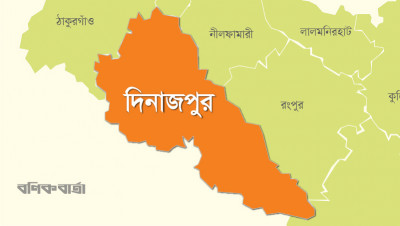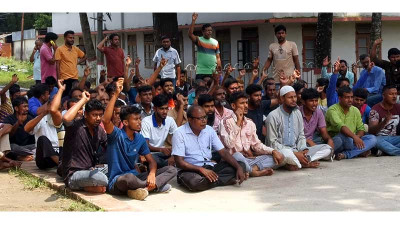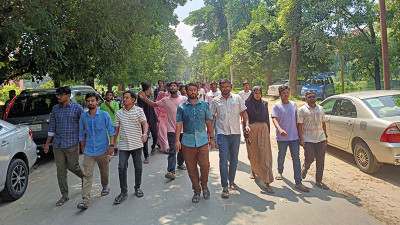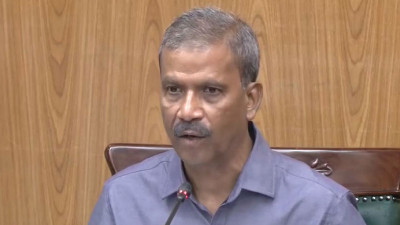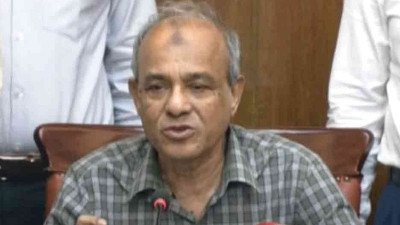 An AI-generated picture of former Awami League government minister AHM Mustafa Kamal.
An AI-generated picture of former Awami League government minister AHM Mustafa Kamal. For
years, questions have swirled around the government’s statistics. Despite
consistent economic growth, the nation struggled to create sufficient
employment, casting doubt on key economic indicators. This situation worsened
when A H M Mustafa Kamal took over as Planning Minister in 2014, leading to
statistical discrepancies. A syndicate of five to six individuals became
involved in manipulating critical data, including inflation rates. Allegations
surfaced that various economic indicators were reported more positive than in
reality, and statistical differences with international organizations grew. The
World Bank reported that between 2015 and 2019, growth was exaggerated by 3.5
percent. Mustafa Kamal, who is more known as Lotus Kamal, is widely believed to
be the mastermind behind these fabricated statistics.
A
H M Mustafa Kamal topped the merit list in the Chartered Accountancy exams
across Pakistan in 1970. Before that, he earned a bachelor’s degree in commerce
in 1967 and a master’s degree in accounting in 1968, both from the University
of Dhaka. He also holds a law degree. Kamal was nicknamed “Lotus” during his
academic career in recognition of his brilliance. However, many believe that
his talents were not used for good. After Sheikh Hasina’s re-election in 2018,
Kamal was rewarded with the role of Finance Minister in 2019 for his role in
creating false statistics.
Experts
assert, “The country’s statistics became entangled in political economy,
manipulated from the highest levels. As a result, growth was consistently
reported in line with the five-year plans, although it did not align with
aggregate data. Methodological changes were made for political reasons, leading
to the dissemination of distorted statistics. The country’s economy has
suffered due to policy decisions based on these erroneous figures.”
The
World Bank publishes scores based on statistical performance across various
countries, considering 25 indicators. In 2014, Bangladesh scored 80 out of 100
in the Statistical Capacity Indicator. However, this score steadily declined,
dropping sharply to 62 in 2018 and further to 60 in 2020, compared to South
Asia’s average score of 69. Bangladesh experienced the most significant decline
in methodological indicators, plummeting from 70 in 2014 to 30 in 2020.
The
Bangladesh Bureau of Statistics (BBS), under the Ministry of Planning, is
responsible for producing and publishing all government statistics. After
taking office, Chartered Accountant A H M Mustafa Kamal established his
exclusive control over the BBS. He also took direct control of the regular
publication of monthly inflation data by the organization. Later, personnel
changes were made in the crucial CPI branch of the BBS, with Kamal’s favored
individuals appointed to key positions. It is alleged that Kamal conducted all
his activities through Masud Rana Chowdhury, a special economic cadre aide who
oversaw the minister’s operations.
Speaking
with current and former officials of the Bangladesh Bureau of Statistics (BBS)
reveals a troubling history spanning the past decade and a half, where open
discourse was essentially stifled. If anyone raised objections or attempted to
discuss discrepancies in the statistics, they were promptly transferred to remote
or less significant branches. They sometimes even faced departmental cases on
dubious grounds. The manipulation of data extended from various BBS branches up
to the offices of the Deputy Director General, Director General, and even the
Secretary. In some instances, inflation data files were sent to the Prime
Minister for approval via the minister, despite regulations dictating that the
Director General is responsible for releasing all BBS data.
The
disparities between the data published by the BBS and international
organizations such as the World Bank and the Asian Development Bank (ADB)
continued to widen. In 2018, Mustafa Kamal, then serving as Planning Minister,
found himself at odds with the World Bank over growth figures. The country’s
growth target for the 2017-18 fiscal year was set at 7.4 percent, but Kamal
claimed in April of that year that the growth would exceed the target, reaching
7.65 percent. On the other hand, the World Bank’s forecast was much more
conservative, predicting a growth rate of no more than 6.65 percent. The ADB
also expressed disagreements with the government’s figures.
This
discrepancy led the government to hold a press conference challenging the World
Bank’s data. During the conference, Mustafa Kamal asserted, “Our data is
correct.” He also issued an ultimatum to the World Bank, demanding that they
sit down with the BBS to revise the data. Kamal even personally called World
Bank representatives, pressuring them to correct the data promptly.
Dr.
Zahid Hussain, who was the World Bank’s lead economist in Dhaka at the time,
told Bonik Barta, “At that time, the government’s growth figures didn’t add up.
We explained this using various models, but Minister Mustafa Kamal became
infuriated and called the World Bank’s Country Director, insisting that the BBS
data was accurate. During the 2015-19 period, the government’s growth figures
were consistently off by about 3.5 percent, which was inexplicable. However, to
avoid further damaging the relationship, we didn’t directly confront the issue
then. In 2022, though, we did hint at it in one of our reports.”
Reflecting
on the consequences of data misrepresentation, the economist added, “It’s like
driving a car blindfolded. Data provides insight into reality. It dictates how
you should govern the country. But if you base your policies on inaccurate
data, you’re bound to hit a roadblock at some point, as we’re witnessing now.
Moreover, contamination has been detected in all statistics, from revenue to
exports.”
In
its 2022 report titled ‘Bangladesh - Country Economic Memorandum: Change of
Fabric’, the World Bank noted that the discrepancy in Bangladesh's growth
figures began to widen in 2010, escalating to 3.7 percent during the 2015-19
period, a gap deemed inexplicable by the international financial institution.
Abdul
Kadir Miah, a director at the Bangladesh Bureau of Statistics (BBS), alleged
that during the tenure of AHM Mustafa Kamal, the BBS was controlled by a
syndicate group. “A syndicate of five to six individuals, led by Joint
Secretary Dr. Dipankar Roy of the Department of Statistics and Information
Management, effectively ran the BBS,” he told Bonik Barta. “This circle managed
to retain Dr. Roy at BBS, even after several transfer orders. Anyone who
questioned their actions was tagged with various political labels. A deputy
director in charge of the Consumer Price Index (CPI) branch was labeled and
sent to a training college. Mustafa Kamal’s associates were then appointed to
key positions. Among them, Mahmudul Haque was appointed as the deputy director
of BBS. He became close to Kamal through Masud Rana, another individual linked
to the syndicate. Publicly, he was involved in Awami League politics. Masud
Rana later secured an overseas posting through the minister and was even
appointed as a director of a state-owned bank.”
Abdul
Kadir Miah, who was subjected to departmental proceedings without an office
assignment, believes his fate was sealed by his protests against the various
injustices he witnessed. Recently, in an effort to avoid further false
harassment, Miah sent a legal notice to the Secretary of Statistics. On August
20, he was finally released from the departmental proceedings.
Bonik
Barta also spoke with the transferred deputy director who had worked at the CPI
branch for eight years. Preferring to remain anonymous, the official said, “I
was tagged in various ways, but the transfer order turned out to be beneficial.
At the training college, I received a scholarship for overseas training. If
someone claims this crucial desk by presenting themselves as an Awami League
member, I have nothing to say. It was an attractive desk, so perhaps someone
else wanted it. I left BBS after the transfer order. Although inflation data
used to be published directly by BBS before, Mustafa Kamal later took control
of it.”
Officials
involved in processing inflation data explained, “The inflation basket now
includes 749 items, such as wardrobes, laptops, and chairs, which are rarely
purchased more than once in a lifetime. Previously, the basket contained 420
items. As a result, despite rising prices of essential goods, the impact on
inflation figures remains minimal. If inflation were calculated based on
essential goods alone, the rate would be several times higher than the current
figure.”
Abul
Kalam Azad, a former director of the Bangladesh Bureau of Statistics (BBS), has
shed light on the data engineering practices within the agency, revealing
instances where inflation rates were deliberately kept below double digits. “A
former adviser once instructed me to reduce the Consumer Price Index (CPI),” he
told Bonik Barta. “Later, a couple of ministers did the same. Inflation never
officially hit double digits; it would always be recorded at something like
9.67 or 9.92 percent. Why does it never exceed 10 percent? There is engineering
in the way survey questionnaires are designed. Questions are structured to
elicit the desired outcomes. For example, a question might ask, ‘Does your
bathroom have a flush?’ A ‘yes’ response would automatically be interpreted as
having a sanitary latrine, even though the presence of a flush does not
necessarily indicate that. This is how data is engineered during analysis.”
Azad
further suggested that large-scale census data should be scrutinized. “We
should examine how economic and agricultural censuses are conducted in the
country. There’s a lot that goes on behind the scenes. There’s a mechanism in
place, but it doesn’t always need to reach the minister’s desk. Many decisions
are made at the director general or deputy director general level, and
sometimes they stop at these firewalls. With dedicated government officials
like Shahnaz Arefin as secretary, why should everything need to go up to the
minister? She received rapid promotions,” he said.
Recalling
an incident where he prevented data distortion, Azad mentioned, “Once,
Dipongkar Roy manipulated data forecasts for Mustafa Kamal. Statistics on
growth and industrial output were exaggerated. I warned him that presenting
such information would damage his reputation. Later, the minister refrained
from presenting that data.”
Abul
Kalam Azad, who joined BBS at the age of 27, served for 32 years and oversaw
the retirement of hundreds of officers, but he himself received no farewell
ceremony. He attributes this to his outspoken nature. This also cost him
several promotions, particularly during Mustafa Kamal’s tenure. Toward the end
of his career, he was transferred to a training college. Out of frustration, he
never returned to the BBS building after his retirement.
During
Lotus Kamal’s tenure, many were transferred outside Dhaka for various reasons.
Sajal Haidar was a statistics officer in the National Accounting Wing. He was
transferred to Bandarban one morning despite his wife being eight months
pregnant. “I had just returned to Dhaka after two years of fieldwork as a
statistics officer. But one morning, I was suddenly released and sent to
Bandarban.” Haidar said. His colleagues’
efforts, including the wing director, to stop the transfer failed. To this day,
he does not know why he was transferred so abruptly while holding a junior
post. He added, “It was a very difficult time for me. My child was due in just
two months, and it was mentally exhausting.”
In
2022, statistics expert Zia Hasan published a book titled “The Mirage of
Development: A Decade of Unspoken Economic History”, which critically examines
the accuracy of government statistics. The book, which garnered significant
attention, exposes the flaws in official data through methodical analysis. In
an interview with Bonik Barta, Hasan stated, “There has been a persistent trend
at the highest levels to present continuous economic growth. The country’s
statistics became entangled with political economics. As a result, despite
aligning growth figures with five-year plans, they didn’t match the
macroeconomic data. Typically, when growth increases, employment should also
rise. However, while industrial growth was reported, employment growth was
shown in agriculture instead. If employment wasn’t increasing, industrial mechanization
should have been widespread, but that wasn’t the case.”
Hasan
further emphasized that accurate statistics could have aided the Sheikh Hasina
government in formulating effective policies. “Due to erroneous data, it was
impossible to implement proper policies regarding interest rates and money
circulation,” he added.
Following
a change in government spurred by a student-led mass uprising, protests erupted
at the Bangladesh Bureau of Statistics (BBS), demanding an end to corruption
and syndicate practices. Demonstrators even detained a secretary, calling for
action against those who had benefited unjustly. BBS officials accused the
institution’s director-general and deputy directors, who were appointed from
other cadres, of being responsible for data manipulation. Consequently, they
demanded that these positions be filled from within the statistics cadre. The
growing unrest also led to a reshuffling within the Consumer Price Index (CPI)
division, resulting in the removal of Mohiuddin Ahmed from his duties.
Commenting on the situation to Bonik Barta, Mohiuddin Ahmed said, “This has
nothing to do with the change in government.” He also dismissed allegations of
political syndication linked to the Awami League, saying, “Malicious
individuals are spreading false and fabricated accusations against me.”
Riti
Ibrahim, a former secretary of the statistics department, acknowledged that
there were indeed questionable practices within government statistics. Speaking
to Bonik Barta, she stated, “In many cases, instead of using data collected
from the field, figures were dictated from higher authorities. Particularly
from the upper echelons. Therefore, it is imperative to appoint professionals
from the statistics field, rather than administrative cadres, to key positions
such as director-general. The BBS is currently being run without statisticians.
This is why an independent commission led by statisticians should oversee the
organization.”
When
approached for comment, Masud Rana Chowdhury, who serves as an additional secretary,
addressed the allegations with Bonik Barta. He remarked, “I was attached to the
minister’s office at that time. Occasionally, I would review BBS files.
Sometimes at the minister’s request, I would call BBS officials to inquire
about certain matters. That’s why my name is being mentioned. I was selected
through an exam to serve as a commercial counselor in South Korea. But there’s
a misconception that this appointment was influenced by the minister, which is
upsetting.” Chowdhury denied any claims of controlling the BBS.
Joint
secretary of the statistics department, Dipankar Roy, dismissed accusations of
syndicate involvement. He told Bonik Barta, “Even though I have been posted
elsewhere, the secretary requested that I stay here due to work requirements.
That's why I’ve been here for six or seven years.”
When
contacted regarding the overall allegations, senior secretary of the statistics
department, Dr. Shahnaz Arefin, declined to comment on matters related to the
Bangladesh Bureau of Statistics (BBS). She expressed frustration at being
called on a holiday and advised reaching out to the director general of BBS
instead. Attempts to contact former planning minister A H M Mustafa Kamal for a
statement were unsuccessful, as his phone was found switched off. There are
rumors that he left the country following the change in government after a
student-led mass uprising.
In
light of the current economic situation, the government is planning to issue a
white paper, with economist Dr. Debapriya Bhattacharya expected to lead the
initiative. When asked by Bonik Barta whether the review of government
statistics would be included in the white paper, Dr. Bhattacharya stated, “Once
the committee is formed, we will decide on the specifics. However, verifying
the accuracy of data is crucial. In the past, politically motivated
methodological changes have led to distorted statistics. We have proposed
forming a separate data commission to address these issues, ensuring that GDP
calculations are accurate. Not only BBS, but also statistics from ERD and banks
will be reviewed. Additionally, work will begin on important data that we
currently lack, such as employment and wage statistics.”


